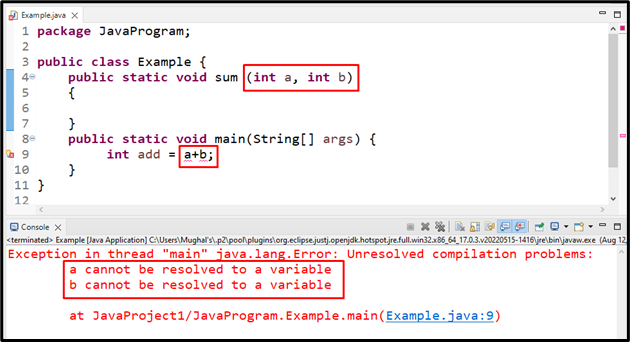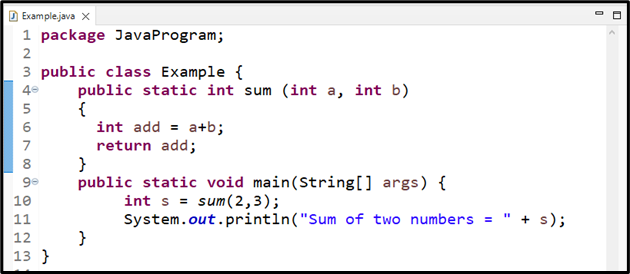When a programmer writes a program in Java, every symbol is placed into the symbol tables, which are used subsequently in the compilation process. As class, variable, and method declarations are processed, their identifiers are bound to matching entries in the symbol tables. Symbol tables are important data structures compilers generate and maintain to hold information used in a source code.
When the Java compiler detects the use of an identifier-like variable that is not located in the symbol table, it encounters the “cannot be resolved” error.
This article will discuss the specified error and offer the method to solve it.
What is the Java “cannot be resolved to a variable” Error?
The missing variable declaration is the most common cause of this error. This error is frequently encountered due to referencing variables and methods outside of their scope or when a reference to an undeclared variable is specified.
As in the given code snippet, we will access variables “a” and “b” in the main() method while it is declared in the “sum()” method, so it throws a Java error “cannot be resolved to a variable” because the specified variables are inaccessible in the current scope. Therefore, a variable must be declared first within the scope before using it in Java:
Now, let’s check out the methods related to fixing the specified error.
How to fix the Java “cannot be resolved to a variable” Error?
To fix the mentioned error, you must use the variable inside the scope. Curly brackets are used in the “{ }” Java to indicate the scope of a class, functions, and various methods.
Here in the given example, we will declare variables “a” and “b” in the “sum()” method. So, the scope of these variables is inside the curly braces of the stated method:
{
int add = a+b;
return add;
}
We will print the value of the sum of variables by calling the method “sum()” in the main() method by storing it in an integer type variable “s”:
int s = sum(2,3);
System.out.println("Sum of two numbers = " + s);
}
In the given example, we have utilized the declared variables within their scope and accessed them without any hassle:
We have compiled all the basic information about what “cannot be resolved to a variable” error is and how to fix it.
Conclusion
To fix the Java “cannot be resolved to a variable” error, you must declare the variable inside the scope where you will utilize it. The missing variable declaration is the most common cause of this error. That’s why it is important to declare a variable before using it in the current scope. This article discussed the reasons for the specified error and how we will fix it.



